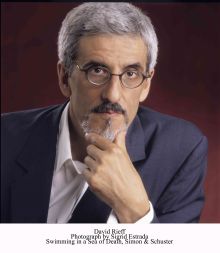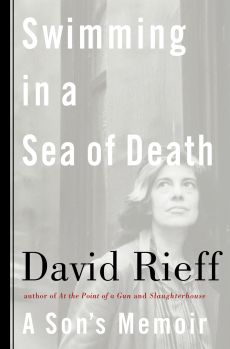David Rieff, a well-recognized author in his own right, is also the son of Susan Sontag, one of America’s defining writers and essayists from the contemporary period. Sontag experienced three difficult bouts with cancer, succumbing in the last one in the last days of 2004. Rieff has portrayed his mother’s final months in ‘Swimming in a Sea of Death,’ a beautiful and very somber memoir about mortality. I put six questions to David Rieff.
1. You call this book a “son’s memoir,” but of course it is a memoir in which your mother is the subject – in her final, painful march to death. But your recollection seems a bit fitful—for instance, you say you decided not to take notes as you knew the process was underway. Tell me something about the process of this book. When did you decide to write it? Was that a change — you seem to suggest a decision not to write? What led you to write it? Was the process of writing it therapeutic for you, did it help you come to grips with the loss of your mother?

My recollection is probably considerably worse than fitful. By not choosing to take notes, I expect that I’ve guaranteed that I’ve misremembered some things. Whether that affects the quality of the book isn’t for me to say (in any case, I’ve always thought that once a book is published, it belongs to its readers not its author — as it obviously is in any case once the writer has died).
The decision not to take notes seemed obvious to me at the time. I did not want to avail myself of that detachment that writers are blessed or cursed with — the sliver of ice in the heart, as P.D. James once put it. Of course, there are many forms of detachment and in a hospital if you can’t avail yourself of some of them, you go crazy. But writerly detachment was, as I say, something I wanted to avoid.
As far as writing Swimming in a Sea of Death goes, it just sort of… happened. I had not intended to write a book, and when I wrote an article about my mother’s death that, in some ways, was the ‘freeze dried’ version of the book for the New York Times Magazine about a year after she died, I thought that was the end of it. But obviously I had more to say, even if finding myself writing the book surprised me.
You ask about the therapeutic, and rightly so. But I’m not sure I can answer that very well or that I have any great insight into my motivations. But, hazily, I have the sense that had I been able to ‘say goodbye’ to my mother — by which I mean talk about the past, tell her I love her (I couldn’t really even do that, at least in a deep register, since she would have understood perfectly well that I was also saying ‘you’re dying’) — I might not have written it. To borrow the title of Simone de Beauvoir’s book about Sartre, there was no ‘ceremony of goodbyes.’ So perhaps that’s what Swimming in a Sea of Death represents for me.
2. A secondary theme of your book goes to medical professionals and their role in this process. I was really struck by a physician you identify only as “Dr. A” who seemed to view your mother as a disease case study, not a human being. The professional is supposed, of course, to operate at some level with a measure of detachment from the persona of the patient. But Dr. A seems oblivious to the personal needs of his patient, in particular, he seems not to understand the need for hope. You contrast Dr. A with others, like Dr. Nimer. Of course, older generations of doctors would have told relatives about the disease and lied to the terminal patient. Is your complaint that Dr. A was a competent physician but a bad human being, or is it deeper than that? Was he a disaster at “bedside manner” and therefore a bad physician? What should a patient expect from a physician when it comes to the presentation of nauseously grim facts?
I have no reason to think Dr. A was a bad scientist or an incompetent physician. Quite the contrary: he is a man of outstanding reputation, widely (and my doctors tell me justly) admired in the profession. I do think he was a terrible clinician though, because my view is that the ability to give comfort to patients is a sine qua non of being a good clinician. This is obviously not the same as saying he’s a bad person; on that, I have no knowledge and no right to an opinion. In any case, it is a great deal to expect that doctors be good scientists, good clinicians, and good psychologists. Indeed, what I found extraordinary, given how hard it is to be all three (and also how badly prepared doctors are by their training for the human interaction), are the number of physicians who succeeded in being just that. I don’t know if my mother was simply lucky to be Stephen Nimer’s patient or not. But it’s hard for me to believe that there are that many Stephen Nimers out there.
3. We always associate the quest for truth with the essence of great writing. But this book steers in a strange direction – it points to relief from the truth, at least when that truth is the inescapable finality of death. You say your mother wanted to know the truth about her condition, but not really. She wanted to hear that there was hope. That concept of hope can easily be cast in religious terms, but for her that certainly was not the case, it seems to be more like Ernst Bloch’s concept in The Principle of Hope, namely something that provides the foundation for artistic creation and happiness. And in your mother’s three bouts with cancer, that is the difference, isn’t it – the final one was without meaningful hope, and hence she didn’t really want the truth. Do I understand this correctly? Was hope essential for her art and her writing?
I don’t really know if my mother construed her work in terms of hope (though she certainly knew the Bloch book). In a sense, I think that while she was identified throughout her career — and to a considerable extent identified herself — as one of the most “European” of American writers, her mot d’ordre was Fitzgerald’s quintessentially American assertion that there are no second acts in American lives. And then, my mother’s love of the world, her insatiable curiosity, made it so hard to leave it. No surprise there. We know from the Buddhist and Daoist traditions (and I suppose from the Stoics as well), that the more you take pleasure in things, the harder it is to be deprived of them. And as I write in the book, my mother in some profound sense thought of mortality as a kind of murder.
4. I recall your mother saying in the late eighties after a successful round with cancer, that she thought the experience of battling with cancer was a positive, deepening, meaningful experience. Her work reflected it. Rilke of course also was plagued by long rounds with disease and wrote that each convalescence was a source of new, deep human experience, furnishing new inspiration. But it’s interesting that he puts the emphasis on the recovery, not on the illness. Was your mother able to produce anything yet unpublished through this horrible experience? When can her readers expect to see it?
No, my mother never was able to write anything about her MDS. She talked about doing so once she got out of hospital. But of course, she never did get out of hospital.
5. You quote a poem by Philip Larkin called “Aubade,”
And specious stuff that says no rational being
Can fear a thing it cannot feel, not seeing
that this is what we fear – no sight, no sound,
No touch or taste or smell, nothing to think with,
Nothing to love or link with,
The anesthetic from which none come round.
It also has an amazing ending, “Postmen like doctors go from house to house.” This is a dark and beautiful poetic lament of the utter finality of death, an understanding that rejects the solace of religion. Why did you pick it, and how does it ring true with your mother’s experience?
Well, it seemed an obvious choice. ‘Aubade’ is the greatest single statement I know of being unreconciled to death — or, again, as I think my mother would have thought of it, of mortality as murder. Certainly, what Larkin expresses in the poem is absolutely what my mother thought and felt and feared. As for religion, well, for my mother that was never an option or even a temptation. She was an atheist to the core of her being.
6. When Thomas Mann was challenged about his fondness for grounding characters in some identifying illness, he responded with a quote from Victor Hugo, “l’humanité s’affirme par l’infirmité.” The human specimen is imperfect, and an illness is thus the very proof of its humanity, it should make a person more approachable in the artistic vision, even though the conventional thinking would say just the opposite. Your mother was a subtle and multifaceted writer and she covered many fields, but it seems that her writing about disease – driven by personal experience – is emerging as her best known work. Is that a mistake? What are the two or three works by your mother that you would have a young college student read today?

I think that my mother’s two books on illness — Illness as Metaphor and AIDS and its Metaphors — are indeed among her most important works. Certainly, if one judges books by their utility to people, I think those two works have had an extraordinary, and positive effect for many, many people, above all in their anti-Reichian de-culpabilization of disease. But I think the novel The Volcano Lover is a very good book indeed and will last, to use the writer’s cliché. I also think some of her denser essays — on Canetti, on Benjamin, on Leni Riefenstahl, and the late essay on translation, “The World as Global India” — will endure. As for the Hugo quote you cite, I wish I could believe that humanity affirms itself through illness and infirmity, but I don’t. Like Nietzsche’s phrase that whatever doesn’t kill you makes you stronger, it seems to me to be the most arrant wishful thinking.
Pick up a copy of David Rieff’s ‘Swimming in a Sea of Death’ at a bookstore near you or order a copy online here.



